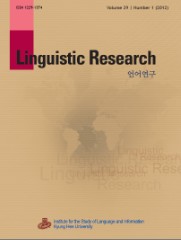학술논문
Can lower inhibitory control lead to better second language phonological contrast learning?
이용수 3
- 영문명
- 발행기관
- 경희대학교 언어정보연구소
- 저자명
- Jieun Lee Hanyong Park
- 간행물 정보
- 『언어연구』제42권 Special Edition, 149~178쪽, 전체 30쪽
- 주제분류
- 인문학 > 언어학
- 파일형태
- 발행일자
- 2025.09.30

국문 초록
Inhibitory control, a domain-general cognitive function involved in selectiveattention, has been linked to individual differences in second language (L2) learning. However, previous research on its role in L2 phonological learning has yielded mixedfindings. To clarify this relationship, the present study investigates how individualdifferences in inhibitory control relate to L2 speech learning, targeting intermediateKorean learners of English. Twenty-four participants completed five days ofcomputer-based auditory training on two English vowel contrasts (/ɪ/-/i/ and /ʊ/-/u/). Inhibitory control was measured using the Stroop task. Participants completed pre- andpost-tests with both trained and novel talkers, as well as everyday identification (ID)tests during the training phase. Results showed that learners with lower inhibitory control(i.e., higher Stroop scores) demonstrated greater improvement over training andincreased use of spectral cues—primary acoustic dimension for the target contrasts—when identifying English vowels. These learners also generalized their learning on howto use spectral cues to stimuli from a novel talker. This study suggests that lower(reduced) inhibitory control, possibly allowing for a broader focus of attention, mayfacilitate a more successful shift from using duration to spectral cues. This is particularlyrelevant in contexts like Korean EFL education, where learners are often instructed torely on durational differences between the target English vowels.
영문 초록
목차
1. Introduction
2. Background
3. Current study
4. Methods
5. Results
6. Discussion
7. Conclusion
References
해당간행물 수록 논문
참고문헌
최근 이용한 논문
교보eBook 첫 방문을 환영 합니다!

신규가입 혜택 지급이 완료 되었습니다.
바로 사용 가능한 교보e캐시 1,000원 (유효기간 7일)
지금 바로 교보eBook의 다양한 콘텐츠를 이용해 보세요!



